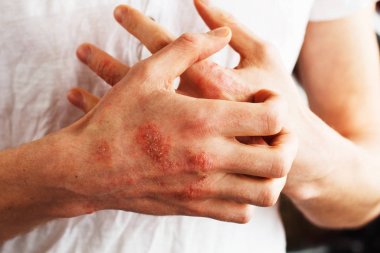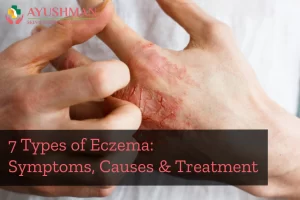Table of Contents
ToggleWhat is Eczema?
Eczema is a common skin disease that can cause irritation and inflammation of your skin. Dermatitis is a common skin condition that means inflammation of the skin and is often used as a synonym for eczema. It affects both adults and children.
Eczema is also known as atopic dermatitis (AD) and atopic eczema. There are several types of eczema, each one has its own symptoms, causes, and treatments. The types of eczema you have can decide what kind of rash you get and where on your body it takes place.
If you are looking for an Eczema Treatment In Dwarka then no look further, click here to book your appointment with our best eczema specialists.
Types Of Eczema
Eczema comes in various forms, each affecting the skin differently and targeting specific areas of the body.
Atopic Dermatitis: Atopic dermatitis takes the lead as the most prevalent form of eczema, unleashing inflamed, itchy rashes on the skin. In the United States, roughly 3 in 10 individuals contend with atopic dermatitis, with children and teenagers primarily affected. Additionally, about 7% of adults experience this type of eczema.
Contact Dermatitis: Contact dermatitis occurs when the skin encounters substances in the environment, such as irritants or allergens. A common occurrence, it affects up to 1 in 5 people at some point in life. The duration can vary, depending on the ease of avoiding the irritant or allergen, making it crucial to identify and address the root cause.
Seborrheic Dermatitis: Seborrheic dermatitis, also known as seborrheic eczema, triggers skin inflammation and itchy scales, often appearing in areas rich in sebaceous glands like the scalp, eyebrows, and cheeks. Less common than some other types, it affects 3-10 out of every 100 people and can manifest in various forms across different age groups.
Dyshidrotic Eczema: Dyshidrotic eczema presents as fluid-filled blisters, or vesicles, on the palms and soles. More prevalent in adults aged 20 to 40, it is often misnamed as dyshidrosis, even though it is not caused by abnormal sweat glands. Other terms include pompholyx, recurrent vesicular palmoplantar dermatitis, or acute palmoplantar dermatitis.
Nummular Eczema: Nummular eczema results in itchy raised bumps, or plaques, commonly found on the arms and legs. Also known as nummular dermatitis or discoid eczema, it typically emerges in specific age ranges, affecting males between 50-65 and females between 15-25.
Stasis Dermatitis: Stasis dermatitis induces rashes, dryness, plaques, crusting, and blisters on the lower leg, ankle, or foot, especially in individuals with poor blood circulation, often associated with chronic venous insufficiency. This type of eczema affects a considerable number of people over the age of 50.
Asteatotic Eczema: Asteatotic eczema causes itchy, scaly, and dry lesions with cracked skin, more commonly known as xerosis or eczema craquelé. Primarily affecting adults over 60, it tends to be more prevalent during the winter months due to reduced indoor humidity.
Neurodermatitis: Neurodermatitis presents as dry, itchy patches that can transform into scaly, thick, or raised plaques. Also referred to as lichen simplex chronicus, this form of eczema is most common in adults aged 30 to 50 and tends to worsen with scratching, creating a challenging cycle of irritation and potential infection.
Eczema Symptoms
Eczema varies from person to person, and flare-ups may occur in different areas each time.
Regardless of the affected skin region, itching is a prevalent symptom, sometimes preceding the appearance of a rash. Common indicators include:
- Redness
- Dryness
- Cracking
- Leathery texture
- Symptoms in Infants
In infants, eczema may result in an itchy rash leading to oozing and crusting, primarily on the face and scalp. It can also extend to the arms, legs, back, and chest, with symptoms often surfacing within the initial weeks or months after birth.
Symptoms in Children:
Children and teenagers typically experience a rash in the folds of their elbows, behind the knees, on the neck, or the wrists and ankles. The rash tends to become scaly and dry over time.
Symptoms in Adults:
In adults, the rash commonly appears on the face, the backs of the knees, wrists, hands, or feet. The skin may exhibit extreme dryness, thickness, or scaliness. In individuals with fair skin, affected areas might initially appear reddish, later turning brown. For those with darker skin tones, eczema can impact pigmentation, resulting in lightening or darkening of the affected area.
Causes of Eczema
The precise cause of atopic dermatitis remains elusive, although individuals with this condition typically exhibit an altered skin barrier compared to those with normal skin, contributing to the onset of the disease. This altered barrier makes their skin susceptible to both water loss and the infiltration of irritants. Additionally, individuals with atopic dermatitis often possess a skin type characterized by an abundance of inflammatory cells.
These factors, whether acting independently or in concert, impact the patient’s skin, resulting in the development of redness and itchy rashes.
Several recognized triggers for atopic dermatitis include:
- Hot water during showers or baths
- Fluctuations in temperature, including heat and cold
- Harsh weather conditions, particularly in dry climates
- Usage of soaps, detergents, and cleansers
- Contact with wool and synthetic fabrics
- The presence of physical irritants such as dirt, sand, and smoke
- Exposure to allergens like pollen, dust, and dander
- Engaging in strenuous physical exercise
- High-stress levels
Prevention And Eczema Treatment
While there’s no outright cure for eczema, effective treatments exist to manage symptoms. Steroid creams are a common prescription during flare-ups, recommended by your doctor. Here are general guidelines for handling eczema:
Treatment For Eczema:
- Moisturize: Apply a moisturizer or emollient at least twice daily, even when your eczema is under control. Opt for thick moisturizers or ointments for better results.
- Wet Dressings: Use wet dressings to cool, protect, and rehydrate your skin.
- Flare-Up Management: Follow your doctor’s advice on using ointments or creams during flare-ups. Steroid creams may be prescribed intermittently, with milder steroids for sensitive areas and stronger ones for others. Adhere strictly to your doctor’s recommendations to avoid rare side effects.
- Itch Control: Manage itching with antihistamines, cold compresses, and refraining from scratching. In some cases, your doctor may recommend using steroid creams at a reduced intensity for itch control.
- Infection Control: If infection arises, use antibiotics as prescribed by your doctor.
Advanced Treatments: In severe cases, dermatologists may explore options like ultraviolet light (PUVA) or potent oral medications to reduce inflammation.
Prevention For Eczema:
- Moisturize Daily: Even when your skin appears healthy, maintain a daily moisturizing routine. Be cautious of moisturizers with chemical additives that could trigger eczema.
- Identify Triggers: Work with your doctor to pinpoint specific triggers for your eczema and develop a personalized action plan.
- Avoid Irritants: Steer clear of substances that can damage or dry out your skin, such as soap or bubble baths.
- Moderate Bathing: Ensure baths and showers are not excessively hot, and rinse off chlorine from swimming pools immediately after swimming.
- Temperature Management: Avoid overheating, and refrain from wearing wool directly on your skin.
By adhering to these guidelines, you can effectively manage eczema, and with age, you may observe improvements in your condition.
When to Seek Medical Attention
Promptly reach out to your doctor if, despite diligently managing your symptoms, you observe any of the following:
- Indications of an infection, include fever, redness, warmth, pus, or the emergence of blisters.
- Abrupt and unfavorable alterations in your eczema condition.
- Lack of improvement despite adhering to prescribed treatments.
Your doctor can provide essential guidance and adjustments to your treatment plan to ensure the most effective management of your eczema.
How Dermatologists Address Atopic Dermatitis (Eczema)
Although atopic dermatitis has no cure, effective management through a personalized treatment plan can significantly enhance control. Crafted by a board-certified dermatologist, such a plan aims to:
- Minimize flare-ups
- Alleviate symptoms, including itch and pain
- Prevent the worsening of atopic dermatitis
- Reduce the likelihood of developing persistently itchy, thickened skin
- Maintain skin hydration
- Mitigate the risk of infection
Tailored to individual needs, dermatologists typically include one or more of the following components in eczema treatment plans.
FAQs For Eczema Treatment
Q: How is eczema diagnosed?
A: Eczema is usually diagnosed based on a physical examination of the skin and a review of medical history. In some cases, a patch test or blood test may be performed to identify specific allergens.
Q: Is eczema curable?
A: While there is no cure for eczema, various treatments can effectively manage symptoms and improve the quality of life. These treatments aim to reduce inflammation, relieve itching, and prevent flare-ups.
Q: What are the main types of eczema treatments?
A: Eczema treatments include topical corticosteroids, moisturizers, antihistamines, and immunomodulators. In severe cases, oral corticosteroids or phototherapy may be recommended.
Q: How can I manage itching associated with eczema?
A: Itching can be managed by using prescribed or over-the-counter antihistamines, applying cold compresses, avoiding scratching, and keeping the skin moisturized.
Q: Are there lifestyle changes that can help with eczema?
A: Yes, maintaining good skincare practices, avoiding triggers, wearing soft, breathable fabrics, and managing stress can contribute to better eczema management.
Q: Can diet affect eczema?
A: Some people may find that certain foods trigger eczema flare-ups. Keeping a food diary and working with a healthcare professional to identify and eliminate potential triggers can be helpful.
Q: Are there natural remedies for eczema?
A: Natural remedies like coconut oil, oatmeal baths, and aloe vera may provide relief for some individuals. However, it’s essential to consult with a healthcare professional before trying alternative treatments.





